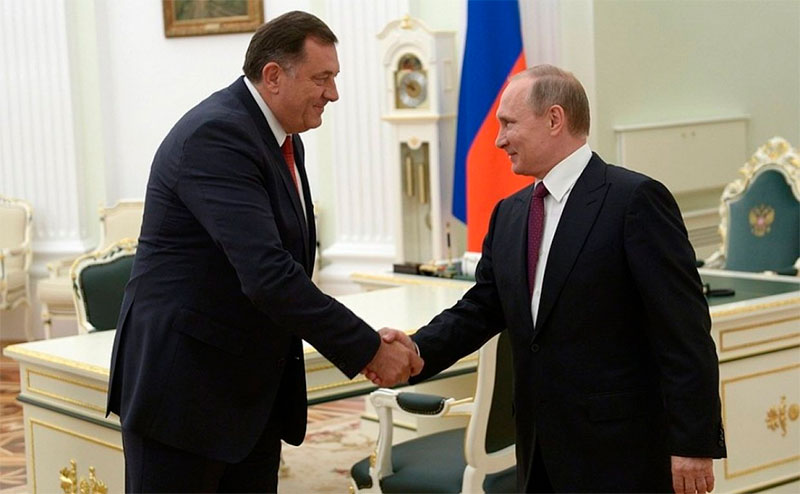On the Eve of Great Events: Leader of the Republika Srpska Arrives in Moscow
In
Login if you are already registered
(no votes) |
(0 votes) |
Ph.D. in History, Senior Research Associate, RAS Institute of Slavonic Studies
President of the Republika Srpska Milorad Dodik became the second major state leader, after the Vice Chancellor, to meet with Vladimir Putin following the Russian parliamentary elections held on September 18, 2016. The meeting took place on September 22, on the eve of the referendum on the National Day of the Republika Srpska that was held this past Sunday. The timing of the visit and the statements made afterwards (particularly by Dodik) suggest that that the meeting with Putin was a simple comparison of notes on political issues. They also tackled the issue of economic cooperation.
Developing relations with Russia is extremely important for the Republika Srpska. Its foreign policy is implemented through special representatives in eight countries (Belgium, Israel, the United States, Russia, Germany, Austria and Greece). Clearly, Russia is a priority position in this short list. Unlike Serbia, however, the Republika Srpska cannot afford to carry out the kind of “multi-vectored” policy declared by Belgrade (Prime Minister of Serbia Aleksandar Vučić visited France recently, and also met with former President of the United States Bill Clinton). And there are a number of reasons for this.

Reuters
What is more, there is no mutual understanding between the two Serbian leaders. Vučić publicly announced that he does not support the idea of a referendum in the Republika Srpska.
We could say that if Vučić, just like Milo Đukanović, is gradually implementing changes in the region that have been imposed by the West (the gradual recognition of Kosovo, the accession of Montenegro to NATO, the development of Serbia–NATO relations), then the leader of the Republika Srpska has no qualms about making his position on the most sensitive issues clear. This puts Dodik in a dangerous position and forces him to look for addition points of support.
As Dodik has said, his trip to Moscow was “an opportunity to fill the President of the Russian Federation in on how the political situation in Bosnia and Herzegovina is developing.” It should be noted that Russia and the Republika Srpska have similar positions on a number of issues. In addition to not supporting the initiative to revise the Dayton Accords, Russia seeks the abolishment of the High Representative for Bosnia and Herzegovina (effectively the Governor-General of the country) and supports the country’s military neutrality [1]. Given that abolishing the external protectorate would be impossible today (if it were to happen, the integrity of the Bosnia and Herzegovina would immediately be called into question), everything comes down to preserving the significance of the Republika Srpska as an institution capable of blocking the various unwanted desires of Bosnia and Herzegovina to damage the national interests of the Serbian people.
What is more, recent events (the NATO Warsaw Summit, where the issue of supporting reform efforts in Bosnia and Herzegovina was discussed, the application for EU membership and even the publication of the census results) bring the problem of the further centralization of Bosnia and Herzegovina to the fore. We should also remember that Dodik’s power weakened following the 2014 elections and he was forced to act quickly in order to keep hold of his positions, show unity within the government and diffuse dissent. The September 25 referendum and the playing of the “national card” in the run-up to the local elections in the Republika Srpska are definitive steps in this direction.
In this respect, it is vital for both sides to understand how the situation with regard to these issues is viewed, as well as the degree to which cooperation might extend. Moscow would like to know how far the Republika Srpska is prepared to go in order to demonstrate its independence. Meanwhile, Milorad Dodik would like to understand the extent to which he can count on the support of Moscow.
While the situation is becoming tenser, it would be folly to say that a confrontation is inevitable. Bosnia and Herzegovina joining NATO is, of course, an undesirable outcome. However, given the right circumstances, it would not all be doom and gloom. It is important that the Republika Srpska preserves its subjectivity, and Russia needs to maintain a presence in the region.
On the other hand, we should not underestimate Dodik’s to ability find compromise solutions with Sarajevo in order to keep hold of his own power. The September 25 referendum on the National Day of the Republika Srpska was a watered-down version of the 2015 referendum on the amenability of Republika Srpska laws to the National Court of Bosnia and Herzegovina, which was abandoned after it came up against considerable pressure. That referendum would have raised the stakes significantly, thus calling Dodik’s position into question (the protest that took place on May 16, 2016, is an example of just how this might happen). Although it is right to point out that the recent referendum, which was instigated by the leader of the Bosnian Muslims Bakir Izetbegović, proves that he and Dodik are capable of agreeing when the political survival of the two leaders is at stake. This much is clear from the agreement on a Coordination Mechanism between Bosnia and Herzegovina and the Republika Srpska in cooperation with the International Monetary Fund, which, according to the media, removes the barriers to European integration for Bosnia and Herzegovina.
Dodik’s visit to Russia can thus be seen as the President sending a signal to the West that Russia supports the Republika Srpska, but that support does not threaten the integrity of Bosnia and Herzegovina, and at the same time preserves the current status of the Republika Srpska. This means securing certain guarantees for the republic, and for Dodik himself, in the context of the “Europeanization” of Bosnia and Herzegovina.
As regards economic cooperation, the fact that took part in the head of the Republika Srpska and Bosnia and Herzegovina under the Moscow Government Duško Perović took part in the meeting is particularly telling. Russia is the Republika Srpska’s leading trade partner (ahead of Serbia, Italy, China and Germany). However, more than 99 per cent of trade turnover between the two countries is made up of Russian exports. While Republika Srpska exports to Russia are increasing, they are still extremely low [2]. And the trend is expected to grow, as a representative office of the Republika Srpska is likely to open at the end of the year. Obviously, the meeting could have involved a conversation about attracting business from the Northwestern Federal District to the economy of the Republika Srpska.
1. Ministry of Foreign Affairs of the Russian Federation. Announcement: “Russia’s Position on the Conflicts and Problem Areas in Europe” (4.03.2016).
2. In 2014, mutual trade between Russia and Republika Srpska was around 548.7 million euros, of which 543.6 million euros is Russian export.
Republika Srpska exports to the Russian Federation amounted to 408,000 euros in 2005; 2.51 million euros in 2012; and 5.07 million euros in 2014. Statistical Yearbook 2015, pp. 350–351.
URL: http://www.rzs.rs.ba/static/uploads/bilteni/godisnjak/2015/20str_2015.pdf
(no votes) |
(0 votes) |




